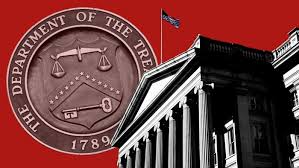At more than $34 trillion, the federal government’s gross national debt has reached a record high that portends political and economic obstacles to improving America’s balance sheet in the years to come.
Tuesday saw the release of a report by the U.S. Treasury Department detailing American financial conditions, which have been a point of contention in politically divided Washington and may result in some government shutdowns in the absence of a yearly budget.
To avert the possibility of what would be a historic default, Republican lawmakers and the White House decided to temporarily raise the debt ceiling last June. The agreement is in effect until January 2025.
Pre-pandemic estimates for the national debt were several years ahead of reality when it surpassed $34 trillion. According to estimates made in January 2020 by the Congressional Budget Office, the gross national debt would surpass $34 trillion in the fiscal year 2029.
Nevertheless, a multi-year pandemic that began in 2020 and shut down a large portion of the US economy caused the debt to grow faster than anticipated. Under former President Donald Trump and current President Joe Biden, the government took on a significant amount of debt to stabilize the economy and promote recovery. However the recovery was accompanied by a spike in inflation, which increased interest rates and increased the cost of the government’s debt servicing.
“Up until now, Washington has been spending money as if we had limitless resources,” said Loyola Marymount University professor of economics Sung Won Sohn. “Ultimately, it is true that there is no free lunch, and the future seems bleak,” he stated.
To evaluate the government’s finances, most policymakers base their assessment of the total debt held by the public on the gross debt, which includes money that the government owes itself. This smaller amount, $26.9 trillion, is almost the same magnitude as the gross domestic product of the United States.
In its 30-year outlook released in June of last year, the Congressional Budget Office predicted that by 2053, publicly held debt will account for a record 181% of the US economy.
Since investors are eager to lend money to the federal government, the national debt does not seem to be a burden on the American economy at the moment. Without having to increase taxes, this lending enables the government to maintain program spending.
However, the trajectory of the debt in the ensuing decades may jeopardize substantial programs like Social Security and Medicare, which have emerged as the main drivers of anticipated government spending over the next several decades, as well as national security. If investors are concerned about politicians’ desire to pay down the U.S. debt, government dysfunction—such as another debt ceiling standoff—could also pose a financial risk.
China, Japan, South Korea, and other European countries are among the foreign buyers of US debt that have already reduced their holdings of Treasury notes.
Foreign ownership of US debt peaked in 2011 at 49% but fell to 30% by the end of 2022, according to a Peterson Foundation estimate.
As the Treasury anticipates borrowing around $1 trillion more by the end of March, debt will continue to soar, according to Michael Peterson, CEO of the Peterson Foundation. Any legislator who is concerned about our nation’s future should see the annual accumulation of trillions more in debt as a bright red warning light.
Each American has debt that amounts to roughly $100,000. Although the amount is substantial, it does not now seem to be endangering the growth of the US economy.
However, if the debt continues to climb to previously unheard-of heights, the risk is long-term. Higher levels of debt, according to Sohn, might raise interest rates and push inflation higher, which would make it more expensive to pay down the country’s debt.
Moreover, as the debt crisis worsens over time and the expenses of Social Security, Medicare, and Medicaid progressively surpass tax receipts, decisions may get direr.
Shai Akabas, director of economic policy at the Bipartisan Policy Centre, says that while it’s impossible to predict when it will become a more serious scenario, “if and when that happens, it could mean very significant consequences that occur very quickly.”
It can indicate sharp increases in interest rates or a recession that results in much higher jobless rates. He warned that it might trigger another round of inflation or strange developments in consumer pricing, some of which have already occurred in the last few years.
Although they disagree on the best way to reduce debt, both Democrats and Republicans have advocated for it.
To balance funding its domestic agenda with lowering budget deficits, the Biden administration has been advocating tax increases on the wealthiest and corporations. To enable the IRS to collect overdue taxes and potentially lower the national debt by hundreds of billions of dollars over ten years, Biden also increased the agency’s funding.
Republican lawmakers have demanded the elimination of the clean energy tax credits and spending included in the Inflation Reduction Act, as well as significant cuts to non-defense government programs. However, Republicans also want to further reduce taxes and cut off financing for Biden’s IRS, both of which might make the deficit worse.
Both assertions are synopses of arguments that voters in this year’s presidential election will probably be asked to consider.
In a statement, White House spokesman Michael Kikukawa placed the responsibility squarely on the Republicans, claiming that “trickle-down debt—driven overwhelmingly by repeated Republican giveaways skewed to big corporations and the wealthy”—was the reason for the debt’s continuous accumulation over time.
Republicans, on the other hand, have claimed that the Biden administration’s borrowing was a factor in the 2022 inflation rise that hurt the Democratic president’s popularity.
“Investors and rating agencies are becoming increasingly concerned that the trajectory we’re on is unsustainable; when that turns into a more dire situation is anybody’s guess,” stated Akabas.

















